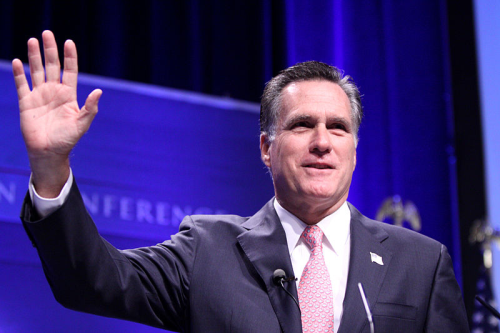 |
As the Obama campaign presses its attack on Mitt Romney’s career at Bain Capital, the one-term governor continues to defend, and even tout, his business credentials (you know, because he doesn’t really like to talk about his time as governor of Massachusetts). “Right now we have an economy in trouble, and someone who spent their career in the economy is more suited to help fix the economy than someone who spent his life in politics and as a community organizer,” Romney told Time magazine
So what is Bain Capital? Bain Capital is a Boston-based private equity firm that Mitt, a co-founder, helped grow into a $66 billion company. While he was at the helm, Bain invested in Staples, which grew from 1 store in 1986 to 1,100 stores in 1996 (in 2011, there were 2000 Staples stores). Other notable investments and acquisitions during Mitt’s time include Sports Authority, Domino’s Pizza, and Sealy (the mattress company). After he left Bain for good in 1999, Mitt got a sweet retirement package; he negotiated an agreement that allowed him to receive something called a “passive profit share” in certain Bain entities, and this deal brought him millions in annual income.
And what is a private equity firm? I don’t really know, but I think it works like this…. A private equity firm like Bain takes money from investors – ranging from pension funds to wealthy individuals – and pools all that money into a private equity fund (think Scrooge McDuck’s Vault). Then the firm invests that money and acquires companies. The goal of the firm is to turn a profit on the acquired companies by improving them, selling them, merging them, and so on. Those profits go back to the investors and the firm keeps a fee for managing the funds.
Romney has said that he created jobs while at Bain. It appears that he did make some jobs, by helping some companies grow, but he eliminated other jobs by dismantling or merging certain failing companies. Bain generally keeps a secret of how many jobs it creates as opposed to how many it eliminates. Its goal, of course, is to make money for its investors, not to create jobs.
Jack Welch, the former CEO of General Electric, recently appeared on Piers Morgan to support Romney and blast Obama’s economic record. Welch, who resembles a particularly scary leprechaun, was adamant that running a private equity company is great experience for a presidential candidate. He went on to explain that private equity saves broken companies which would otherwise go under, by investing in and reinvigorating them. Even Welch, however, admitted that Mitt may have went too far when he said that he created jobs. Welch explained that, generally, private equity does not create a lot of jobs, but instead it preserves good-paying, sustainable jobs by making failing companies profitable again.
So, because of his time at Bain Capital, Mitt claims to be a far more qualified steward of the economy than President Obama – who is seeing an economic recovery, but a very slow one.
Does Mitt’s business experience give him a better perspective on how to approach national economic policy? Or does Obama’s career in politics and government give him the right tools? I just don’t know. But I do know this, the Republicans’ unfailing icon – Ronald Reagan – had a pretty good run at boosting the economy – through tax cuts and Cold War spending, among other things. And he was no business executive. Actor, president of the Screen Actor’s Guild, ideal grandfather-face – this experience was all Ronnie needed.
